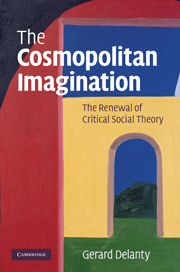Book contents
- Frontmatter
- Contents
- Preface and acknowledgements
- Introduction
- 1 The rise and decline of classical cosmopolitanism
- 2 Contemporary cosmopolitanism and social theory
- 3 Global ethics, solidarity and the problem of violence
- 4 Cosmopolitan citizenship and the post-sovereign state
- 5 Multiculturalism from a cosmopolitan perspective
- 6 Religion in a cosmopolitan society
- 7 Cosmopolitanism, modernity and global history
- 8 Cosmopolitanism and European political community
- 9 Europe as a borderland
- 10 Conclusion: inter-cultural dialogue in a post-Western world
- Bibliography
- Index
5 - Multiculturalism from a cosmopolitan perspective
Published online by Cambridge University Press: 18 January 2010
- Frontmatter
- Contents
- Preface and acknowledgements
- Introduction
- 1 The rise and decline of classical cosmopolitanism
- 2 Contemporary cosmopolitanism and social theory
- 3 Global ethics, solidarity and the problem of violence
- 4 Cosmopolitan citizenship and the post-sovereign state
- 5 Multiculturalism from a cosmopolitan perspective
- 6 Religion in a cosmopolitan society
- 7 Cosmopolitanism, modernity and global history
- 8 Cosmopolitanism and European political community
- 9 Europe as a borderland
- 10 Conclusion: inter-cultural dialogue in a post-Western world
- Bibliography
- Index
Summary
Throughout the world multiculturalism is entering a new and decisive phase. Traditionally associated with North America and Western Europe, multiculturalism can be applied to almost any multiethnic society. It is no longer possible to view it in the terms of any one tradition. Indeed, as will be discussed in detail in this chapter, there is no one tradition of multiculturalism and even the dominant Western models have changed over the past few decades. In the affluent societies of Western Europe it would appear that multiculturalism is under attack from the right while in central and Eastern Europe new discourses of ethnopluralism coincide with the belated discovery of Western multiculturalism. In many parts of the world there have been significant developments in the direction of multiculturalism. Yet there is little attention given to how non-Western societies have responded to the rise of multiculturalism which, having been internationalized, is now part of most societies throughout the world. In this chapter I argue that, despite their differences, all traditions of multiculturalism have been influenced by the Western liberal heritage and have come to rest on certain assumptions that are not always valid for the kind of challenges facing multiethnic societies today.
The discourse of multiculturalism must be brought in a different and, I argue, more cosmopolitan direction. There are three major dimensions to this. First, the distinction between the cultural and the social must be abandoned.
- Type
- Chapter
- Information
- The Cosmopolitan ImaginationThe Renewal of Critical Social Theory, pp. 132 - 156Publisher: Cambridge University PressPrint publication year: 2009

